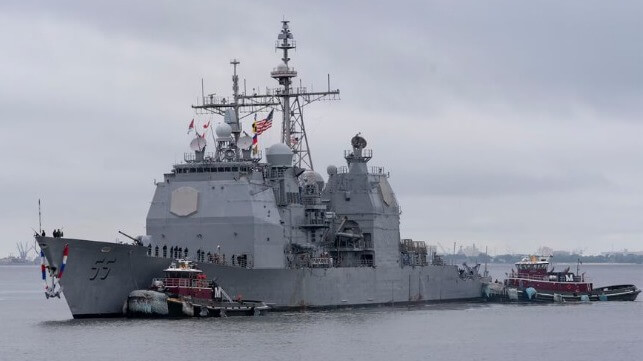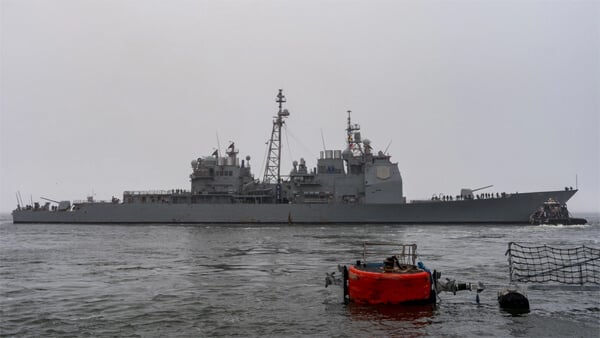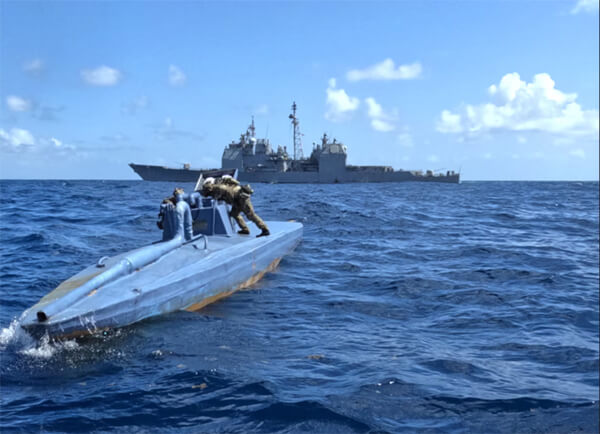USS Leyte Gulf Completes Last Deployment as Ticonderoga Class Nears End

The guided-missile cruiser USS Leyte Gulf returned to Naval Station Norfolk, on May 17, completing its final deployment after 37 years of active service. She was one of four vintage Ticonderoga-class guided missile cruisers, along with the USS Antietam, USS Cowpens, and USS Vicksburg, the Navy recently listed to transition to inactive status and which will be used as a primary means of cannibalization and equipment removal.
Named after one of World War II’s largest naval battles, “The Battle of Leyte Gulf” fought in 1944 in the Philippine Sea which was considered a decisive battle that pushed back Japanese naval forces, the ship was commissioned in September 1987. She was one of a class of 27 ships, with the Navy having already decommissioned and disposed of the first class and now moving to retire the main section of the class. The last of the vessels is scheduled to be decommissioned in 2027.
“This ship is full of history. Each period brings its own far-off journeys, along with generations of sailors who have manned the helm,” said Capt. Nathan Diaz, the commanding officer of Leyte Gulf. “Our last deployment was full of sailors who made their mark on the story of this great warship.”

Departing Norfolk for her final deploy this year (USN)
The ship has a diverse service record including being deployed off East Africa to protect against Somali pirates. In 2011, the U.S. Navy reported she had participated in operations which had captured 75 Somali pirates and had missile strikes by her carrier strike group against the Libyan government. Earlier in her career, she was involved in an at sea collision with the aircraft carrier USS Theodore Roosevelt while conducting operations off the coast of North Carolina. The cruiser sustained $2 million in damage.
The Leyte Gulf departed Norfolk on January 28, 2024, on her final deployment sailing into the South Atlantic to conduct maritime interdiction and theater security operations in the U.S. 4th Fleet area of operations. The Leyte Gulf operated with regional partners and conducted operations to stop illicit drug trafficking. During their final deployment, the Leyte Gulf embarked the “Valkyries” of Helicopter Maritime Strike Squadron 50 and partnered with the U.S. Coast Guard Law Enforcement Detachment.
“The crew of Leyte Gulf is a model for maritime teamwork,” said Vice Adm. Doug Perry, Commander, U.S. 2nd Fleet. “They partnered with Navy air assets and Coast Guard interdiction teams, showcasing the 2nd Fleet’s ability to extend our presence and maintain homeland defense in other fleets. This is a profound final chapter for one of the Navy’s finest ships, and their crew should be proud of all they accomplished.”

Interdiction of a semi-submersible during her final deployment in the South Atlantic (USN)

that matters most
Get the latest maritime news delivered to your inbox daily.
The Leyte Gulf performed maritime interdiction operations and disrupted 4,100 kilograms of cocaine. They detected and seized a self-propelled semi-submersible containing 2,370 kilograms of illicit drugs, which was later destroyed during a sinking exercise. The Coast Guard team that was aboard also took control of three vessels during interdiction operations and removed 15 narcotics traffickers from the narcotics trade.
The class of ships was planned with a 35-year lifespan. Due to delays in the replacement plan, the Arleigh Burke-class destroyers will serve as short-term role replacements until the expected commissioning of the Navy’s next-generation destroyers in the 2030s.
